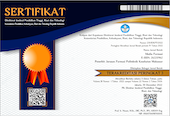Respon Streptococcus pneumonia Terhadap Senyawa Fitokimia Ekstrak Etanol dan n-Heksan Daun Salam (Syzygium polyanthum Wight)
Abstract
Response Of Streptococcus pneumonia To Photochemical Compounds Of Ethanol and n-Hexane Extract Of Salam Leaf (Syzygium polyanthum Wight)
Pneumonia due to pneumococcal bacteria is generally caused by Streptococcus pneumonia. Pneumonia cases in Indonesia in 2019 reached 400 thousand and increased due to the impact of Covid-19 on children. The response of bacteria to chemical compounds is scientific proof of the antibacterial properties of a plant extract that is polar or non-polar based on the type of solvent used in the extraction process. Method. Identification of active compounds in extracts based on phytochemical screening. The antibacterial potential was determined based on the ability of the active compound to inhibit the growth of Streptococcus pneumoniae by agar diffusion. The test materials were ethanol extract and n-hexane of salam leaf (Syzygium polyanthum Wight). The results showed that the ethanol extract contained alkaloids, phenols, tannins, flavonoids, glycosides, saponins, and phlobatanins. Hexane extract contains alkaloids, glycosides, and saponins. It was concluded that Streptococcus pneumonia responded to ethanol extract of salam leaves and cephalosporins but did not respond to hexane extract from salam leaves. Ethanol extracts 1,3 and 5% were bacteriostatic but hexane extracts with the same concentration did not inhibit the growth of Streptococcus pneumonia.
Keywords: Syzygium polyanthum Wight; Antibacteria;, Streptococcus pneumoniae
Pneumonia akibat bakteri pneumokokus umumnya disebabkan oleh Streptococcus pneumoniae. Kasus pneumonia di Indonesia tahun 2019 mencapai 400 ribu dan meningkat akibat dampak Covid-19 pada anak. Respon bakteri terhadap senyawa kimia adalah pembuktian ilmiah sifat antibakteri dari suatu ekstrak tanaman yang bersifat polar atau non polar berdasarkan jenis pelarut yang digunakan dalam proses ekstraksi. Metode. Identifikasi senyawa aktif dalam ekstrak berdasarkan skrining fitokimia. Potensi antibakteri ditentukan berdasarkan kemampuan senyawa aktif menghambat pertumbuhan Streptococcus pneumoniae secara difusi agar. Bahan uji ekstrak etanol dan n-heksan daun salam (Syzygium polyanthum Wight). Hasil penelitian menunjukkan ekstrak etanol 96% mengandung alkaloid, fenol, tannin, flavonoid, glikosida, saponin dan phlobatanin. Ekstrak heksan mengandung alkaloid, glikosida dan saponin. Disimpulkan Streptococcus pneumoniae memberikan respon terhadap ekstrak etanol daun salam dan cefalosforin namun tidak memberikan respon terhadap ekstrak heksan daun salam. Ekstrak etanol 1,3 dan 5% bersifat bakteriostatik namun ekstrak heksan dengan konsentrasi yang sama tidak menghambat pertumbuhan Streptococcus pneumoniae.
Kata kunci : Syzygium polyanthum Wight; Antibakteri; Streptococcus pneumoniae
Full Text:
PDF (Bahasa Indonesia)References
Amalina, N., 2014. Chemical composition, antioxidant and antibacterial activity of essential oil from leaf of. Fac. Ind. Sci. Technol. Univ. Malaysia Pahang.
Evendi, A. 2017. Uji Fitokimia dan Antibakteri Ekstrak Daun Salam (Syzygium Polyanthum) terhadap bakteri Salmonella thypi dan Escherichia coli secara in vitro. Mahakam Medical Laboratory Technology Journal. Vol II No. 1, Mei 2017. Hal 1-9.
Harismah Kun, dkk,2016. Pemanfaatan Daun Salam (Syzygium Polyanthum (Wight). Sebagai Obat Herbal Dan Rempah Penyedap Makanan. Warta LPM, Vol. 19 No.2
Kemenkes RI, 2017, Farmakope Herbal ed.II, Jakarta
Kemenkes RI., 2020. Profil Kesehatan Indonesia tahun 2020. Pusat Data dan Informasi Kemenkes RI. Jakarta.
Hardini, M. dan Prastiyanto, M.E., 2017. Daya Hambat Ekstrak Daun Salam (Syzygium polyanthum [Wight]Walp ) Terhadap Bakteri Salmonella thypi. J. Chem. Inf. Model. 53.
Monalisa, M., Erly, E., Fransiska, A., 2021. Uji Daya Hambat Ekstrak Daun Salam (Syzygium polyanthum Wight) Terhadap Pertumbuhan Bakteri Porphyromonas Gingivalis Secara In Vitro. Andalas Dent. J. 9. https://doi.org/10.25077/adj.v9i1.98
Pakadang, SR dan Salim, H. 2019. Kombinasi Daun Miana (Coleus scutellarioides (L.)Benth) dan Rimpang Jahe (Zingiber officinale Rosc.) Sebagai Antibakteri Streptococcus pneumonia, Staphylococcus aureus, Staphylococcus epidermidis, Klebsiella pneumonia Penyebab Batuk. Media Farmasi 15 (1),1-6,2019.
Pakadang,SR,2018, Potential of Miana Leaves (Coleus scutellarioide (L) Benth) As an Antibacterial Streprtococcus pneumonia, Staphylococcus aureus, Staphylococcus epidermidis, Klebsiella pneumonia, Proceeding. International Conference Health Polytechnic of Kupang, 122-131,2018.
Prianti, N.P., Ellin, F., 2013. Review Artikel: Tinjauan Aktivitas Farmakologi Ekstrak Daun Salam (Syzygium Polyanthum (Wight.) Walp). Farmaka 16.
Putra, I.A., Erly, E., Masri, M., 2015. Uji Efek Antibakteri Ekstrak Etanol Kulit Batang Salam (Syzigium polyanthum (Wight) Walp) terhadap Staphylococcus aureus dan Escherichia coli secara In vitro. J. Kesehat. Andalas 4. https://doi.org/10.25077/jka.v4i2.281
Qolbi, N., Yuliani, R., 2018. Skrining Aktivitas Antibakteri Ekstrak Etanol 70% Sepuluh Daun Tanaman Terhadap Klebsiella pneumoniae. Pharmacon J. Farm. Indonesia. 15, 8–18. https://doi.org/10.23917/pharmacon.v15i1.6169
Rambe, KN, Albert P, Rumondang BN. 2012. Uji Antibakteri Ekstrak Metanol Daun Salam (Syzigium Polyanthum) terhadap Bakteri Escherichia coli dan Salmonella Sp. Jurnal Saintia Kimia.;1(1):35- 9.
DOI: https://doi.org/10.32382/mf.v18i2.2974
Refbacks
- There are currently no refbacks.

This work is licensed under a Creative Commons Attribution-NonCommercial-ShareAlike 4.0 International License.
Kontak Editor
Hendra Stevani
Jurusan Farmasi Poltekkes kemenkes Makassar
email : hendra@poltekkes-mks.ac.id

This work is licensed under a Creative Commons Attribution-ShareAlike 4.0 International License.





.png)


